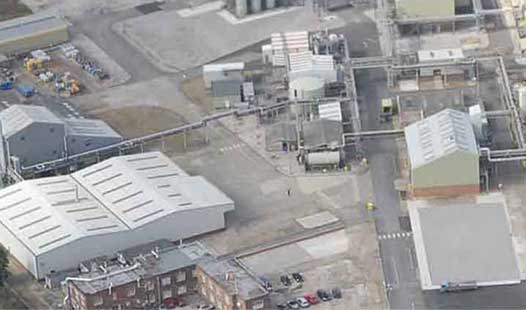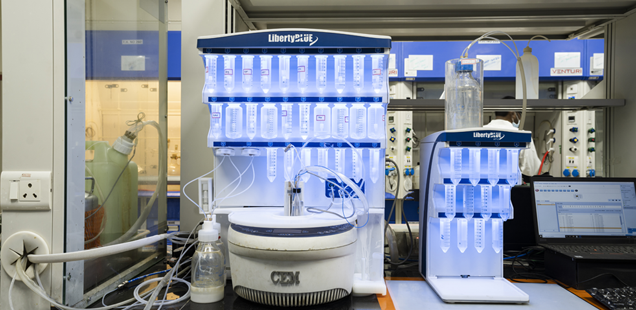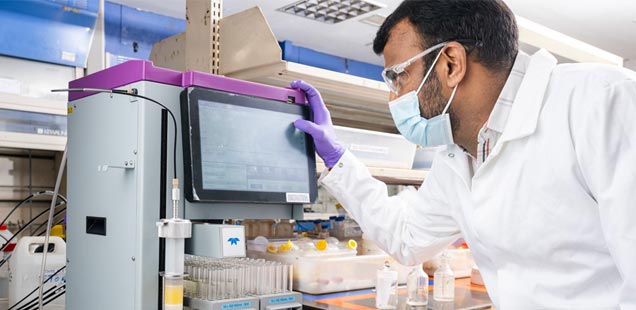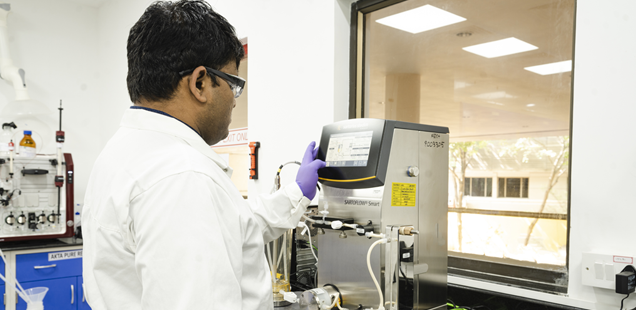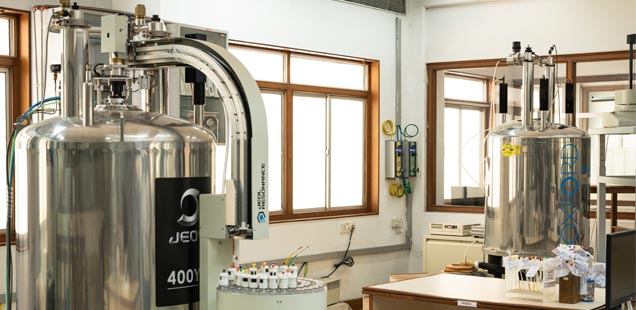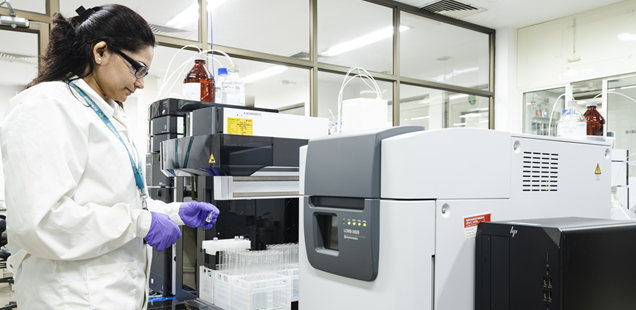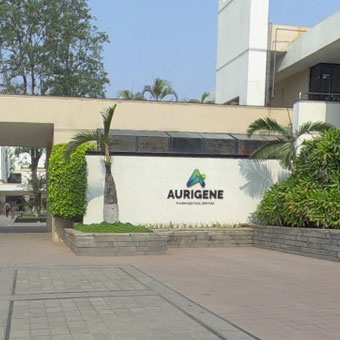
The pharmaceutical analytical research team at APSL is highly experienced with the current regulatory requirements. Our process chemistry team ensures that every method suits the process requirements for raw materials, APIs, and formulations. In addition to method verification, development, and validation, we also facilitate impurity identification and characterizations, isolation of impurities by preparative scale purification, reverse phase/normal phase, ion-exchange, or gel filtration chromatographic techniques. The state-of-the-art infrastructure at our R&D centers is equipped with the latest analytical instrumentations that enable us to provide high-quality, cost-effective services for our customers.
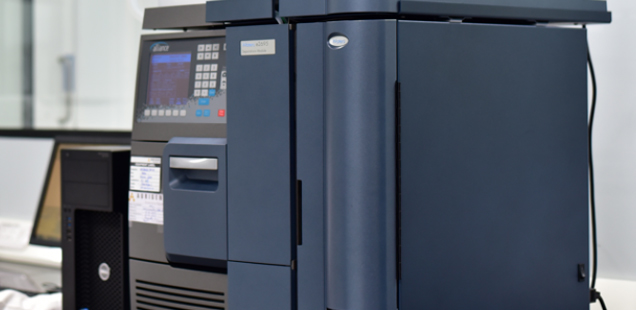
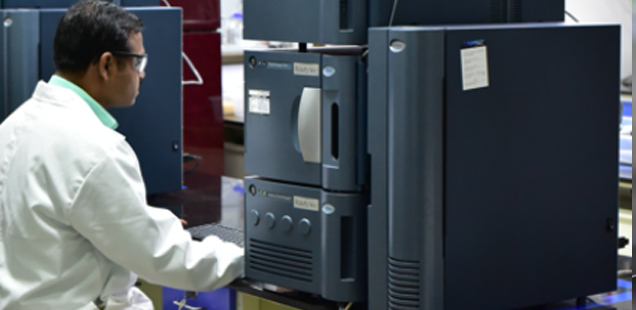
Our custom services also include
- Purity of Enantiomers
- Identification of related substances and assay
- Method development for non-chromophoric compounds
- Fate and purge studies
- Genotoxic Impurity (GTI) studies
- Impurity isolation and characterization
- Assay, dissolution, content uniformity and impurities content studies
Analytical instrumentation at APSL
- HPLC with VWD, DAD, ELSD, CAD and RID
- UPLC with VWD and DAD
- LC-MS/MS triple quard
- LCMS-TOF
- GC and GC-HS
- GC-MS (EI/CI MSD)
- Ion Chromatography
- ICP-OES
- AB Sciex QTRAP 4500 Mass Spec
- NMR 400 MHz
- Amino Acid Analyzer
- Dissolution: USP type I and type II, small volume dissolutions using USP Type II apparatus and in-vitro diffusion cell apparatus
- UV-VIS Spectrophotometer
- FT-IR Spectrophotometer
- Polarimeter
- Auto-titrator and KF Apparatus
- Differential Scanning Calorimeter
- Thermo Gravimetric Analyzer
- Particle Size Analyzer (Malvern)
- Nano-particle Size Analyzer (zeta sizer)
Why Aurigene Analytical Chemistry Services?
High-end analytical instruments
Diverse, high-potent and complex profile of compounds
Close collaboration between expert scientists in analytical chemistry and process chemistry
Method development and quality check
Connect with our scientific experts for your drug discovery, development, and manufacturing needs
We understand that clear communication is essential to successful collaborations, and that's why we have a dedicated team that is always ready to help you. Whether you have questions about our services, want to discuss a potential partnership, or simply want to learn more about our company, we're here to help.
Our team of experts is dedicated to providing personalised solutions tailored to your unique needs. So, please don't hesitate to reach out to us. We look forward to hearing from you and helping you achieve your business goals.
Frequently asked questions
What experience does APSL have with Pharmaceutical Analytical Services?
- Analytical method development, method validation, and method transfer of Key Starting Materials ( KSM), Intermediates and drug substance. We also have experience in developing and validating following analytical methods.
- Purity/Related substances/Assay by HPLC
- Purity/Related substances/Assay by GC
- Residual solvents by GC/GC-HS
- Impurity profiling by HPLC/GC/LC-MS/GC-MS
- Identification and characterization, quantification of impurities by LC-MS/GC-MS & NMR
- Trace level elemental impurities identification and quantification by ICP-MS
- Genotoxic impurities
- Cleaning method development and validation
- Holding study/stability studies
- Hygroscopic study (EP/USP)
- Melting point determination/identification of different polymorphs/determination of Glass transition temperatures by DSC
- Safety studies for the reaction mass samples by DSC
- Thermogravimetric analysis for the samples (TGA)
- Trace level ions determination by Ion chromatography
- Particles size distribution (PSD)
- Purification/isolation of impurities and characterization
- Purification/isolation of desired compounds
- Amino acids analysis
- Peptide analysis
- CMC activities (establishment of Physico-chemical properties for the regulatory submission)
Which samples can be analyzed at APSL?
We can analyze the below development samples related to
- Testing of raw materials
- Testing of in-process samples
- Testing of intermediates
- Testing of drug substance
Which guidelines does APSL use to perform method validation?
Below are the set of guidelines used for method validation
| <1225>&<1226> | US Pharmacopoeia chapter |
| CDER Guidance | Guideline for Submitting Samples and Analytical Data for Methods Validation. February 1987. |
| CDER Reviewer Guidance | Validation of Chromatographic methods. November 19 |
| ICH Q2 (R1) | Validation of Analytical Procedures: Text and Methodology, International Conference on Harmonization |
| ICH Q6A | Specifications: Test Procedures and Acceptance Criteria for New Drug Substances and New Drug Products: Chemical Substances, International Conference on Harmonization. |
| ICH Q7 | GMP Guidance for Active Pharmaceutical Ingredients, International Conference on Harmonization. |
| RDC.N°17 | Good Practices for medicament manufacturing |
| RDC.N°53 | “Establishes parameters for reporting, identification and qualification of degradation products in synthetic drugs with active substances and semi-synthetic classified as new, generic and the like, and other measures”. |
| RE.N°166 | Guide for validation of Analytical and Bio-analytical methods |
| USP General chapters | General tests and assays. |
Which analytical lab equipment/instruments are used at APSL?
Below is the list of equipmen/instruments used
- HPLCs with wide range of detectors (UV, PDA, CAD, RID and ELSD), Waters and Agilent
- GC with Headspace and FID, Agilent make
- GC-MS Agilent make (model: 5975C)
- LC-MS- AB Sciex QTRAP 4500
- UPLC-TOF, Waters
- ICP-MS- Agilent make (model: 7800)
- Ion chromatography, Metrohm
- FT-IR, spectrum one, Perkin Elmer make (model: spectrum one)
- Polarimeter, Jasco (model P2000)
- Karl-Fisher apparatus, Metrohm
- Auto titrator, Metrohm
- Differential scanning calorimeter (DSC), TA (model: TA DSC Q 2000)
- Thermo gravimetric analyzer (TGA), TA
- Particle size analyzer, Master sizer 3000
- Amino acid analyzer, Sykam
Does APSL perform analytical method development in order to ensure that the analytical method is “stability-indicating”?
Stability indicating nature of analytical method will be demonstrated during analytical method development of drug substance related substances and assay method. To demonstrate the stability indicating nature of analytical method, degradation samples shall be generated by stressing the test sample with acid, base, water hydrolysis, oxidative, thermal and photostability study . The degraded sample shall be analyzed and demonstrated the separation of degradation impurities from known impurities and analyte peak. Photostability study shall be carried out as per ICH QIB.
You are about to leave Aurigene Pharmaceutical Services and affiliates website. Aurigene Pharmaceutical Services assumes no responsibility for the information presented on the external website or any further links from such sites. These links are presented to you only as a convenience, and the inclusion of any link does not imply endorsement by Aurigene Pharmaceutical Services.
If you wish to continue to this external website, click Proceed.

Leaving already?
Don't forget to join us at
CPHI Worldwide 2023.
October 24th-26th, 2023 | Barcelona, Spain
Get ready to accelerate your drug’s journey to the market

